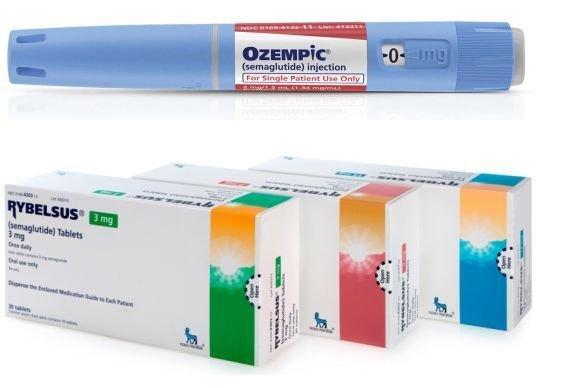治疗肥胖症使用中国索马鲁肽/司马鲁肽(SEMAGLUTIDE)效果如何?
印度代购提示:索马鲁肽是一种胰高糖素样肽(GLP-1)受体激动剂,已经被批准用于2型糖尿病的治疗。与利拉鲁肽和其他抗糖尿病药相比,索马鲁肽的优势之一是作用时间长,因此,每周一次注射就足够了。2017年12月,美国食品药品管理局(FDA)批准了注射型索马鲁肽。此前的一项2期临床试验发现,索马鲁肽减轻了2型糖尿病患者和肥胖者的体重,体重减轻被认为是由于降低患者食欲引起的能量摄入减少。因此,诺和诺德组织开展了关于索马鲁肽对肥胖症患者的治疗效果(Semaglutide Treatment Effect in People with Obesity, STEP)的多项3期临床试验,旨在评估每周皮下注射2.4 mg剂量的索马鲁肽对超重和肥胖症患者的有效性和安全性。
Somalutide, a glucagon-like peptide (GLP-1) receptor agonist, has been approved for the treatment of type 2 diabetes. One of somarutide's advantages over liraglutide and other anti-diabetes drugs is that it takes longer to act, so a weekly injection is sufficient. In December 2017, the US Food and Drug Administration (FDA) approved the injectable version of Somarutide. A previous Phase 2 trial found that somalutide reduced weight in people with type 2 diabetes and obesity, which is thought to be due to a reduction in energy intake caused by reducing a patient's appetite. As a result, Novo Nordisk conducted several phase 3 clinical trials on Semaglutide Treatment Effect in People with Obesity (STEP). To evaluate the efficacy and safety of a weekly subcutaneous dose of 2.4 mg sommarutide in overweight and obese patients.

索马鲁肽
印度代购提示:2021年2月,美国西北大学Robert F. Kushner教授等在《新英格兰医学杂志》在线发表了STEP系列中的第一项临床试验(STEP 1)的结果。这项临床试验评估了索马鲁肽与安慰剂相比作为生活方式干预的辅助手段治疗肥胖症患者或伴有心血管危险因素的超重者的有效性和安全性,结果显示索马鲁肽具有十分良好的减肥效果。是在亚洲、欧洲、北美洲和南美洲的16个国家和地区的129个地点进行的一项随机、双盲、安慰剂对照的临床试验。研究者招募了1961名超重或肥胖但没有糖尿病的成年人(18岁或以上),他们通过一种或多种自我报告的饮食方法未能成功减肥。受试者按2:1的比例将其随机分配至治疗组(n=1,306)和对照组(n=655)。治疗组接受每周一次2.4 mg索马鲁肽皮下注射,而对照组接受安慰剂皮下注射,试验期为68周。所有参与者均接受生活方式干预。主要终点是体重的百分比变化和体重减轻至少5%的参与者比例。
印度代购提示:结果发现,索马鲁肽组从基线到第68周的平均体重下降14.9%,而对照组的平均体重下降2.4%,治疗差异为12.4个百分点(P<0.001)。索马鲁肽组的体重减轻达5%、10%和15%的人数和比例分别为1047人(86.4%)、838人(69.1%)和612人(50.5%),而对照组则分别为182人(31.5%)、69人(12.0%)和28 人(4.9%)。索马鲁肽组的平均体重下降为15.3 kg,而对照组的平均体重下降为2.6 kg,治疗差异为12.7 kg.与对照组相比,索马鲁肽组在心血管代谢危险因素和身体机能方面的改善均更大。索马鲁肽组最常见的不良反应是恶心和腹泻,但是这些不良反应通常是短暂的,轻度至中度,并随着时间而消退。索马鲁肽组因胃肠道事件而终止治疗的人数多于对照组,分别为59例(4.5%)和5 例(0.8%)。
Indian daigou hint: Results The somalutide group had a mean weight loss of 14.9% from baseline to week 68 compared with a mean weight loss of 2.4% in the control group, with a treatment difference of 12.4 percentage points (P<0.001). 1,047 (86.4%), 838 (69.1%) and 612 (50.5%) participants in the Sommarutide group lost 5%, 10% and 15% of their body weight, compared with 182 (31.5%), 69 (12.0%) and 28 (4.9%) in the control group. The mean weight loss in the sommarutide group was 15.3 kg versus 2.6 kg in the control group, with a treatment difference of 12.7 kg. Improvements in cardiovascular metabolic risk factors and physical function were greater in the sommarutide group than in the control group. The most common adverse reactions in the Sommarutide group were nausea and diarrhea, but these were usually transient, mild to moderate, and resolved over time. More patients in the sommarutide group discontinued treatment due to gastrointestinal events than in the control group, 59 (4.5%) and 5 (0.8%), respectively.





 咨询客服
咨询客服